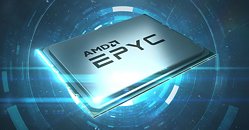Wednesday, December 13th 2017

Baidu Deploys AMD EPYC Single Socket Platforms to Power its 'ABC' Datacenters
AMD and Baidu, the leading Chinese language Internet search provider and leader in artificial intelligence (AI), today announced the immediate availability of AMD-powered AI, big data, and cloud computing (ABC) services. Utilizing the compute performance and advanced feature-set of the AMD EPYC processor in a single-socket platform allows Baidu to efficiently optimize and deliver massive storage and compute services to its customers. Baidu expects to further expand its use of AMD EPYC processors across its global datacenters beginning in the first quarter of 2018.
"By offering outstanding performance in single-processor systems, the AMD EPYC platform provides flexibility and high-performance in our datacenter, which allows Baidu to deliver more efficient services to our customers," said Liu Chao, senior director, Baidu System Technologies Department. "Baidu's mission is to make a complex world simpler through technology, and we are constantly looking to discover and apply the latest cutting-edge technologies, innovations, and solutions to business. AMD EPYC processors provide Baidu with a new level of energy efficient and powerful computing capability.""Baidu is a long-recognized pioneer in datacenter innovations, and with their adoption of AMD EPYC they continue down that path by leveraging our single-socket innovations to power their ABC strategy," said Scott Aylor, corporate vice president, and general manager, AMD Enterprise Solutions. "It is a thrilling experience to work side-by-side with Baidu to explore the capabilities of AMD EPYC and maximize its application across their customers' workloads."
With support for 128 lanes of PCIe connectivity, an AMD EPYC processor delivers 2.6X the I/O density than competitive solutions1 and enables Baidu to achieve a level of scale and efficiency unrivaled in high-performance x86. The combination of performance from the EPYC processor cores, and compute and I/O density packaged in a single-socket configuration, provides the ideal platform for Baidu's next generation cloud services.
"By offering outstanding performance in single-processor systems, the AMD EPYC platform provides flexibility and high-performance in our datacenter, which allows Baidu to deliver more efficient services to our customers," said Liu Chao, senior director, Baidu System Technologies Department. "Baidu's mission is to make a complex world simpler through technology, and we are constantly looking to discover and apply the latest cutting-edge technologies, innovations, and solutions to business. AMD EPYC processors provide Baidu with a new level of energy efficient and powerful computing capability.""Baidu is a long-recognized pioneer in datacenter innovations, and with their adoption of AMD EPYC they continue down that path by leveraging our single-socket innovations to power their ABC strategy," said Scott Aylor, corporate vice president, and general manager, AMD Enterprise Solutions. "It is a thrilling experience to work side-by-side with Baidu to explore the capabilities of AMD EPYC and maximize its application across their customers' workloads."
With support for 128 lanes of PCIe connectivity, an AMD EPYC processor delivers 2.6X the I/O density than competitive solutions1 and enables Baidu to achieve a level of scale and efficiency unrivaled in high-performance x86. The combination of performance from the EPYC processor cores, and compute and I/O density packaged in a single-socket configuration, provides the ideal platform for Baidu's next generation cloud services.

10 Comments on Baidu Deploys AMD EPYC Single Socket Platforms to Power its 'ABC' Datacenters
#justslapme
When you read claims like "Baidu has 97% effectiveness in voice recognition" or similar, just remember it's FOR CHINESE.
And to give you a hint how important this is: a voice recognition algorithm that works pretty well in English turns out to be way worse for more complicated languages: like Polish, Hungarian or Norwegian (even if it's learning on similar amount of data).
So what happens here is: Baidu is developing it's algos using one of the most complicated languages on Earth. So transition to other countries in Asia and Europe should be a lot easier than what American companies are facing now (Google, MS, Apple).
And this is not the first time we see something like this. Enter: Tesla Autopilot.
Tesla developed some pretty nice hardware and software for their cars. And it works pretty well in California: with their rectangular city layouts and wide highways.
Tesla Autopilot does NOT work in Europe. For example: it doesn't understand roundabouts. So I asked a colleague who actually works on AI in California and it turned out they don't have roundabouts in US and they don't have real-world data for the model...
The simple fact is: models developed partly in Europe (in cooperation with European car manufacturers, like Google does) will work in Europe and won't have a problem on a simpler road network in US.
So why I'm talking about this? Because just like with languages: if a Chinese company creates a car AI that works there, it'll most likely succeed anywhere on this planet: